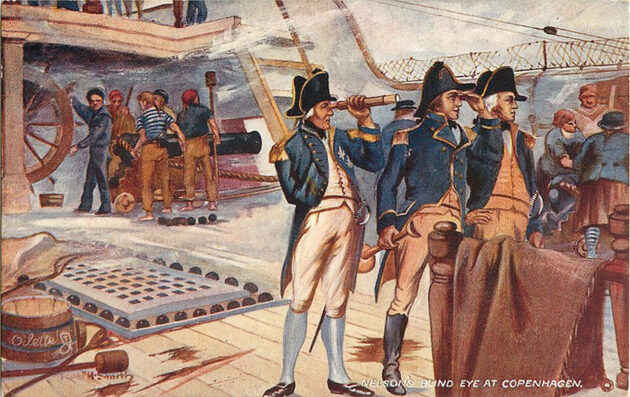Gerry
To turn a blind eye
Lit: to deliberately overlook something
We seem to be having a few nautical phrases lately and this one, of course, was first formulated during the Battle of the Copenhagen in 1801. Vice-Admiral Lord Horatio Nelson was second in command of the fleet that was besieging Copenhagen in the Baltic. At that time the illustrious seaman had had an honourable if somewhat traumatic career having lost an arm at the battle of Santa Cruz in Teneriffe and later an eye at Calvi.
Nelson, directing action aboard HMS Elephant was informed of the signal by the signal lieutenant, Frederick Langford, but angrily responded: “I told you to look out on the Danish commodore and let me know when he surrendered. Keep your eyes fixed on him.” He then turned to his flag captain, Thomas Foley, and said “You know, Foley, I have only one eye. I have a right to be blind sometimes.” He raised the telescope to his blind eye and said “I really do not see the signal.

Ignoring his superiors, he went on to defeat the Danes scoring another major victory. Despite ignoring the Flag he was commended for his actions and later awarded the title of Viscount Nelson of the Nile.
This phrase has some similarity to its auditory counterpart – turning a deaf ear – which is a very much older aphorism. Walter Hylon in ‘Scala Pefeccionis’ or Perfect steps [to God], used it in about 1440 “Make deef ere to hem as though thou herde hi not” In this case to ignore the injunctions of the false prophet or devil. We also find other versions of this phrase in many literary works, notably John Heywood (c. 1497 – c. 1580) an English writer known for his plays, poems, and collection of proverbs.
Turning a blind eye and turning a deaf ear are synonymous and both mean to ignore or deliberately overlook something. The phrase ascribed to Nelson was almost certainly built upon the context of the much older phrase of turning a deaf ear, the origins of which I shall explore in a future phrase of the day.
Please share this BFD article so others can discover The BFD.

